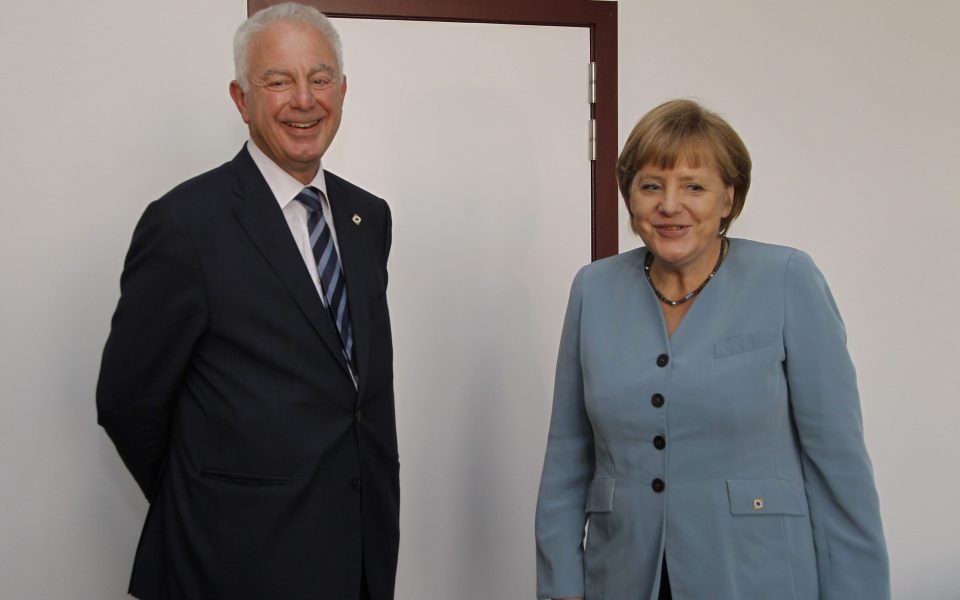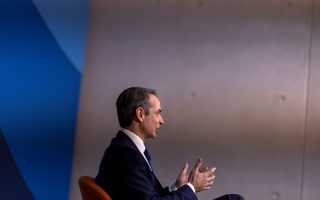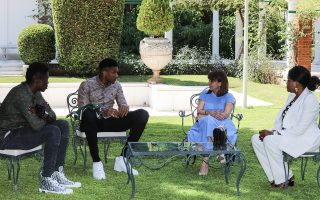A pivotal meeting

Following the May 2012 election, which ended up in a deadlock for the formation of a new government, as head of the Council of State, I was sworn in as caretaker prime minister to lead the country to new elections. The situation was, if not bleak, at the very least critical. My country was under the threat of bankruptcy and our relations with Europe and its leaders were almost broken. So my visit to Brussels for the extraordinary summit was of critical importance. I had to gain the trust of European leaders, and in particular of German Chancellor Angela Merkel, who played a deciding role.
I tried to arrange a meeting with her, which was no small feat, as I was practically unknown among the other European leaders. Foreign Minister Petros Molyviatis had an initial contact with the chancellor during the NATO Summit in Chicago and requested the meeting. My friend and then undersecretary of the German government Thomas Rachel, whose help I had also requested, played a key role. He sent a message with a few kind words about me to the chancellor and after a while he informed me that an appointment was scheduled.
When I came to Brussels I was very anxious, faced with the gravity of the issues which were at stake. The tension that had developed in our relations with the European Union was evident during my meeting with President Jose Manuel Barroso. He was very aggressive against Greece, something that provoked me. On the contrary, President Herman Van Rompuy was extremely kind and very helpful. He even gave me the draft conclusions, so that we could work on them and submit our comments.
In view of this, I arrived at the meeting with the chancellor a lot calmer. To break the ice, I had prepared a friendly greeting in German. My knowledge of the language was much appreciated by her and so we agreed that interpretation was not necessary and we could move on to our discussions using both German and English.
She initially asked my views about the situation in Greece. The rise of Golden Dawn particularly worried her. I explained that my country needed both the support and the financial aid of the EU. I described the political climate in Greece, underlining that any kind of political intervention would not be beneficial.
She listened carefully and reassured me that, despite what was being said, she had never thought of intervening in the developments and the affairs of the Greek state, although she described to me her difficult relations with Greek politicians and her frustration with how some of them had behaved. I defended them.
I then asked the chancellor to treat me in the same way that she would treat a German supreme court judge. I stressed that that, in my capacity as a judge, I understood exactly the meaning of “pacta sunt servanda” (which was constantly repeated to me during my visit to Brussels) and that I intended to abide by what had been agreed, provided of course that this would not lead to economic disaster for my country or the division and dissolution of Greek society.
The chancellor reassured me of her decision to support Greece and asked me what more she could do. As we had agreed with all the political parties, I asked her for two things: a) the project bonds for investments and projects and, b) the granting of loans by the European Investment Bank. She promised that she would grant these and I must admit that she kept her word. So, later, during the summit, when other countries asked for a large participation in the project bonds, she looked at me and said in a sharp voice that, after consultation with the Greek prime minister, these would be allocated as a matter of priority to Greece.
At the end of the meeting she escorted me out and told me that we could be in touch until the elections. The meeting, initially scheduled to last 15 minutes, ended up lasting almost 50 minutes, making those outside the room wonder about what was happening behind the closed doors. I left with boosted morale, as I believed that I had managed to gain the chancellor’s trust and her support for my country in those difficult times.
After the meeting, Ι talked to the chancellor several times on the phone about issues that were coming up and current developments. She always listened to me carefully and expressed her views calmly, politely, but also decisively. I could add a few more things that we discussed, for example our talk of soccer, but it is not yet the time to do so.
No one, not even her harshest critics, question that the chancellor kept her country united and led Europe in challenging times of crisis. She wisely tipped the scales during a turbulent period. She handled different situations and people patiently and methodically. For all her politeness and genial nature, she had an iron determination and perseverance to lead things the way she thought was right. One could argue that she was slow to make decisions, waiting for the developments, but when she did, she was firm in her opinion. In this context, sometimes she may have delayed, having also needed some pressure from the other side of the Atlantic in helping Greece. But when she took the decision, she followed it consistently until the end, despite sometimes facing great difficulties, and she exhausted all reserves so that Greece would stay in Europe.
Personally, I have a great impression and very pleasant memories of Chancellor Angela Merkel, whom I consider to be a great politician.
Panagiotis Pikrammenos is a Greek judge and politician who currently serves as the deputy prime minister of Greece.





